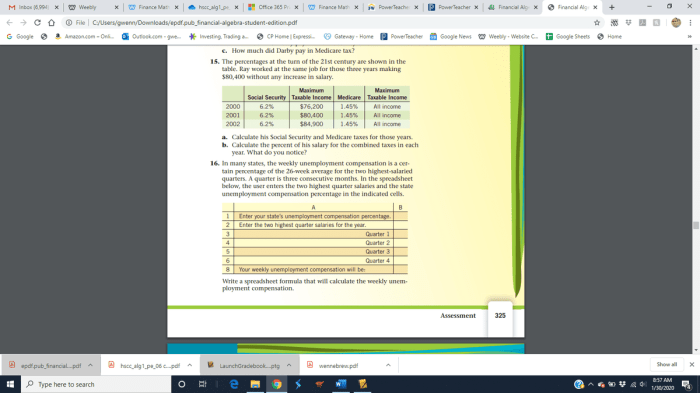Unveiling the intricacies of personal finance, Lesson 8 Homework Practice Financial Literacy Answer Key embarks on an enlightening journey, providing a comprehensive guide to navigate the complexities of financial well-being. With a focus on essential concepts, budgeting strategies, investment opportunities, and debt management techniques, this guide empowers individuals to take control of their financial futures.
Delving into the fundamentals of financial literacy, this resource equips readers with the knowledge and skills necessary to make informed financial decisions. From understanding the basics of budgeting and expense tracking to exploring the nuances of saving, investing, and credit management, this guide serves as an invaluable companion for anyone seeking to achieve financial success.
1. Key Financial Concepts
Financial literacy empowers individuals with the knowledge and skills to manage their finances effectively. Essential concepts include budgeting, saving, investing, debt management, and financial planning. Understanding these concepts is crucial for personal and economic well-being.
Financial literacy enables individuals to make informed financial decisions, avoid costly mistakes, and achieve financial goals. It promotes financial stability, reduces stress, and contributes to overall well-being.
2. Budgeting and Expense Tracking
Budgeting Framework
A practical budgeting framework involves categorizing expenses (e.g., housing, food, transportation) and allocating funds accordingly. It ensures expenses align with income and promotes financial discipline.
Expense Tracking
Effective expense tracking involves recording all purchases, no matter how small. This provides a clear picture of spending habits, identifies areas for potential savings, and prevents overspending.
| Expense Category | Amount | Date |
|---|---|---|
| Groceries | $100 | 2023-03-08 |
| Gas | $50 | 2023-03-15 |
3. Saving and Investing
Significance of Saving
Saving is essential for financial security, unexpected expenses, and long-term goals (e.g., retirement, education). It promotes financial stability and reduces reliance on debt.
Investment Strategies
Investment strategies vary depending on risk tolerance and financial goals. Common strategies include stocks, bonds, mutual funds, and real estate. Diversification across asset classes is crucial to manage risk.
Investment Options
- Stocks: Represent ownership in companies, offer growth potential, but carry higher risk.
- Bonds: Loans to companies or governments, offer lower returns but less risk.
- Mutual Funds: Baskets of stocks or bonds, provide diversification and professional management.
- Real Estate: Physical property, can generate rental income or appreciation, but requires significant capital.
4. Debt Management: Lesson 8 Homework Practice Financial Literacy Answer Key

Risks of Debt, Lesson 8 homework practice financial literacy answer key
Debt can be beneficial when used responsibly, but excessive or uncontrolled debt can lead to financial distress, reduced credit scores, and legal consequences.
Responsible Debt Management
Responsible debt management involves assessing debt levels, prioritizing high-interest debt, and creating a debt repayment plan. Seeking professional help is recommended if struggling with debt.
- Debt Consolidation: Combining multiple debts into one loan with a lower interest rate.
- Debt Settlement: Negotiating with creditors to reduce the amount owed.
- Credit Counseling: Non-profit organizations provide guidance and support in managing debt.
Questions and Answers
What is the significance of financial literacy?
Financial literacy empowers individuals to make informed financial decisions, manage their finances effectively, and achieve their financial goals.
How can I create a practical budgeting framework?
Design a budget that aligns with your income and expenses, prioritizing essential needs and allocating funds accordingly.
What are the different investment strategies available?
Explore various investment options such as stocks, bonds, mutual funds, and real estate, each with varying levels of risk and potential returns.